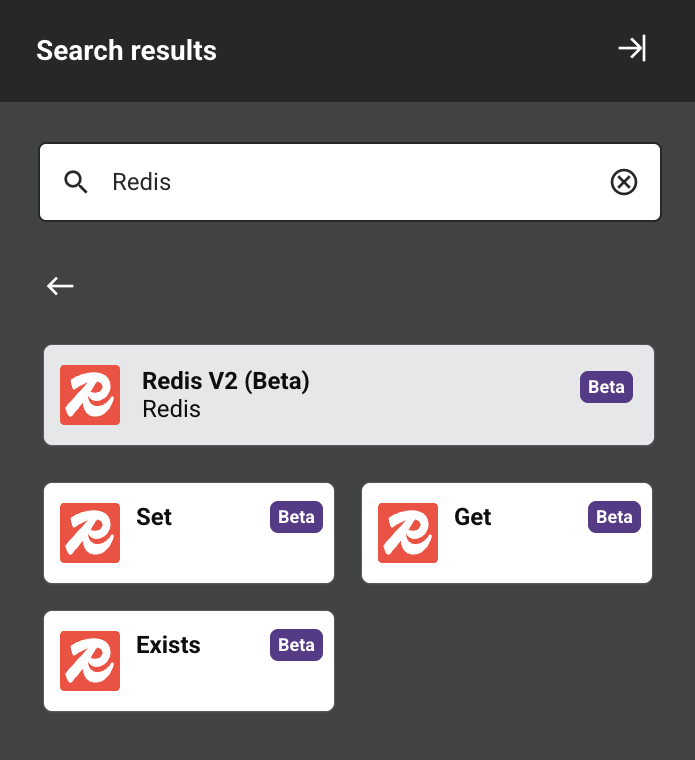Redis v2 connector for Jitterbit Studio
Summary
The Redis v2 connector establishes access to Redis.
The Redis v2 connector provides an interface for creating a Redis v2 connection, the foundation used for generating instances of Redis v2 activities. These activities, once configured, interact with Redis through the connection.
The Redis v2 connector is accessed from the design component palette's Project endpoints and connectors tab (see Design component palette).
Connector overview
This connector is used to first configure a Redis v2 connection. Activity types associated with that connection are then used to create instances of activities that are intended to be used as sources (to provide data in an operation) or targets (to consume data in an operation).
Together, a specific Redis v2 connection and its activities are referred to as a Redis v2 endpoint:

-
Set: Sets keys in Redis and is intended to be used as a target in an operation.
-
Get: Gets keys from Redis and is intended to be used as a source in an operation.
-
Exists: Checks if keys exist in Redis and is intended to be used as a target in an operation.
-
Delete: Deletes keys from Redis and is intended to be used as a target in an operation.
-
Get TTL: Gets keys' time to live (TTL) values from Redis and is intended to be used as a source in an operation.
Note
This connector is a Connector SDK-based connector, which may be referred to by Jitterbit when communicating changes made to connectors built with the Connector SDK.
Endpoints created with this connector are included in endpoint usage reporting and count toward your license.
Prerequisites and supported API versions
The Redis v2 connector requires the use of an agent version 10.1 or later. These agent versions automatically download the latest version of the connector when required.
The Redis v2 connector uses the Redis client API. Refer to the API documentation for information on the schema nodes and fields.
The Redis v2 connection requires a valid connection string or connection credentials to access your Redis instance. If using Amazon ElastiCache or Azure Cache for Redis, additional requirements must be met.
Amazon ElastiCache
If using Amazon ElastiCache:
- Configure the instance as an Amazon ElastiCache for Redis OSS.
- Set up an Amazon Virtual Private Cloud (VPC).
- For external access, use AWS Direct Connect, a VPN, or a bastion host.
- Set SSL to true under Enable Client Configuration in the Redis v2 connection.
Note
Serverless Amazon ElastiCache instances cannot have clustering disabled.
Azure Cache for Redis
If using Azure Cache for Redis:
- Configure the instance with Access Key Authentication enabled and clustering disabled.
- If using an Azure private endpoint, create an Azure Virtual Network (VNet) before provisioning the Azure Cache.
- For seamless connectivity, host your agents in the same VNet as the Azure Cache. If your use case doesn't allow for this, allowlist trusted external IPs in your VNet network security group (NSG).
- Set SSL to true under Enable Client Configuration in the Redis v2 connection.
Troubleshooting
If you experience issues with the Redis v2 connector, these troubleshooting steps are recommended:
-
Click the Test button in the connection configuration to ensure the connection is successful and to ensure the latest version of the connector is downloaded to the agent (unless using the Disable Auto Connector Update organization policy).
-
Check the operation logs for any information written during execution of the operation.
-
Enable operation debug logging (for cloud agents or for private agents) to generate additional log files and data.
-
If using private agents, you can enable connector verbose logging for this connector by adding this logger configuration entry to your private agent's
logback.xmlfile:<logger name="org.jitterbit.connector.redis" level="DEBUG"/>For more information on connector verbose logging, see Verbose logging for connectors using Jitterbit private agents.
-
If using private agents, you can check the agent logs for more information.